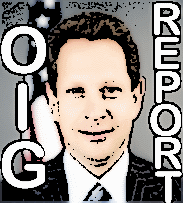
A former supervisor with the Securities and Exchange Commission unwittingly aided a man accused of operating a Ponzi scheme in Arizona, according to a report by SEC Inspector General H. David Kotz.
Meanwhile, Kotz reported that the Office of Inspector General (OIG) also investigated a case in which an SEC enforcement accountant allegedly threatened a supervisor by email. The supervisor, according to Kotz, reported the incident to the SEC’s Security Branch, claiming that the accountant “routinely brought a ‘large buck knife’ to work.”
A “buck knife” commonly is associated with hunting, although the report did not identify the weapon as a hunting knife.
On April 1, investigators interviewed the accountant and discovered he was carrying a folding knife with “a 31/2 to 4-inch blade.” An investigator also discovered two similar knives in the accountant’s back pack. The knives were confiscated “immediately,” and the accountant was placed on leave and banned from the building.
“The OIG found that the Enforcement Accountant violated Title 18 U.S.C. § 930 of the
Federal criminal code by knowingly carrying dangerous weapons into a federal facility,” according to the Kotz report. “Specifically, the OIG found that on April 1, 2009, the Enforcement Accountant knowingly possessed at least three ‘dangerous weapons’ in a ‘federal facility,’ as those terms are defined in 18 U.S.C. § 930(g), and had routinely been in possession of dangerous weapons within the SEC building for several years despite his own admission that he knew it was unlawful to do so.”
Investigators also discovered evidence that suggested the accountant “was not completely truthful in his testimony before the OIG and in his previously-submitted Declaration for Federal Employment regarding his prior criminal conviction and probation for driving while intoxicated.”
Federal prosecutors referred the case to an administrative proceeding, and the SEC is seeking to fire the accountant. The dismissal case is pending.
Ponzi Case And ‘Soothsayer’
In the Ponzi case, the OIG concluded that a former supervisor in the SEC’s Office of Administrative Services used an SEC computer to exchange “approximately 2,300 e-mails that were related to the Ponzi scheme perpetrator and his companies.”
Although the Kotz report did not identify the specific Ponzi suspect by name, the Arizona Corporation Commission (ACC) did in a June 11 news release: Jerome Carter of Scottsdale.
ACC identified Carter as a purported “soothsayer” who could predict the future. Carter said on his website that he checked into a hotel in the World Trade Center on Sept. 10, 2001, one day before the 9/11 attacks.
Getting a “bad feeling” later in the day, Carter said, he checked out of the hotel. The Trade Center complex was struck by two hijacked airliners the next day, killing nearly 3,000 people.
Carter himself was killed in a motorcycle accident in September 2009, about four months after admitting he had operated the Ponzi scheme.
“Through a website, video teleconferences, radio shows and event appearances, Carter proclaimed himself as an international numerologist and spiritual adviser who could predict the future,” ACC said. “While working as a life coach to individuals in his VIP coaching program, Carter represented to potential investors that he could, through the use of numerology concepts, improve their financial well-being by investing in futures and commodities.
“As owner and operator of The Greatest Only Divine Productions, LLC and Good Only Done Productions, Carter sold investment and commodity contracts totaling $432,450 to at least 65 investors,” ACC said. “The Commission found that Carter used investor funds for his own personal use and benefit, but in Ponzi-like fashion, returned a total of $154,450 to some of the investors. In settling this matter, Carter admits to the Commission’s findings and agrees to the entry of the consent order.”
During its probe of Carter, ACC came into possession of emails from the SEC supervisor and turned them over to the OIG.
“The ACC investigator also informed the OIG that several other witnesses in the ACC investigation had identified the Supervisor as the person who handled money for this Ponzi scheme perpetrator and his companies,” the Kotz report said.
OIG investigators did not name the supervisor in the report, but said she took early retirement after the OIG probe began and accepted a $25,000 buyout.
“The OIG discovered that during the period in question, the Supervisor used her SEC e-mail account to conduct business on behalf of the Ponzi scheme perpetrator and his companies on virtually a daily basis,” the Kotz report said. “The OIG found that the Supervisor was extensively involved in handling the payments to and from his victims, and used her SEC e-mail account to communicate directly with those victims.”
No evidence was found that the supervisor knew Carter was operating a Ponzi scheme.
OIG investigators “did find that the Supervisor violated Commission rules and policies on the use of SEC office equipment, as well as the Standards of Ethical Conduct for Employees of the Executive Branch by using the SEC’s email system, her SEC computer, and other SEC resources to assist the Ponzi scheme perpetrator operate his companies, whether or not she knew those companies were a Ponzi scheme,” according to the report.
Federal prosecutors declined to file criminal charges, the Kotz report said. The OIG recommended that the SEC try to claw back the $25,000 buyout accepted by the former supervisor, and the matter is pending.
Read the Inspector General’s report.